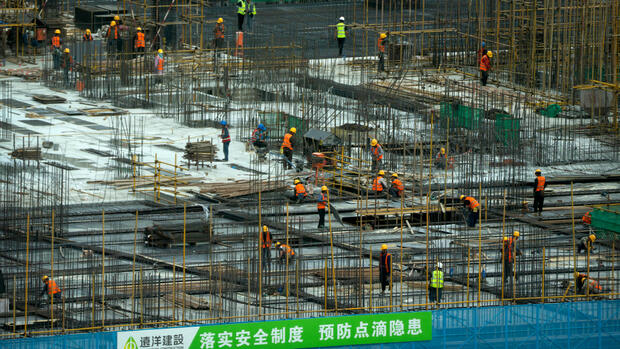Because the construction industry in China is ordering fewer new machines, German machine builders expect business to be worse.
(Photo: AP)
Beijing The business of the German machine builders in China threatens to be much worse this year than previously expected. While the Association of Mechanical Engineers (VDMA) has so far assumed growth of six percent, President Karl Haeusgen only expects an increase “in the low single-digit range, between zero and three percent,” he told journalists in Beijing on Tuesday.
The main reason from Hauesgen’s point of view: Important customers are reluctant to invest, above all the construction industry.
The second largest economy in the world is recovering from the consequences of the strict zero-Covid policy much more slowly than many had hoped. That is why the Chinese government is increasingly promoting foreign investments. The VDMA also feels this, because Haeusgen and his delegation were received by Trade Minister Wang Wentao during their visit to China, for the first time in the history of the association.
According to the association, 900 of the 3,700 VDMA member companies have a branch in China and employ around 150,000 people there. In the USA, on the other hand, around 750 companies are represented, with 100,000 employees. The figures show the strong focus of the manufacturing industry on China over the past 30 years.
For a long time, German industry had seen a kind of “lemming-like China boom” that “has paid off in a similar way to the cheap raw materials from Russia,” says Haeusgen. For example, business in China had been an “almost sure bet” for German machine builders for almost 20 years. This created a cluster risk, he admits.
Companies have to adapt to the Taiwan crisis
Overall, China’s share of sales in German mechanical engineering is only ten percent. In individual segments or in certain companies, however, it is significantly higher at 20 to 30 percent, although these have so far exported their products entirely from Germany. Above all, they would have to check whether an abrupt halt to this business as a result of a military attack by China against Taiwan could threaten their existence.
>> Read also: German companies in China: “If a shot is fired in Taiwan, I’ll be broke”
A precise analysis of the supply chains is just as important. Because here the lack of a single component from China could lead to a standstill of production, so the risk diversification is correspondingly more complicated, according to Haeusgen.
The fact that the industry is now rethinking China is evident from the latest flash survey conducted by the VDMA at the end of June, in which 680 companies took part. For the first time in around two decades, China is no longer the most popular investment location for German machine builders outside of the European home market. The People’s Republic not only fell behind the USA, which attracts investments with its industrial policy, but also behind India. Haeusgen considers the latter to be the “actual surprise”.
In an earlier survey of machine builders represented in China in April, 45 percent of the companies said they were rethinking their China strategy. The reasons for this are the weak economy, geopolitical risks and the disadvantage compared to Chinese competitors, for example in public tenders.
According to Haeusgen, the “nationalizing industrial policy” has increased since the takeover of power by head of state and party leader Xi Jinping. Nevertheless, the association president warns against decoupling China. During his talks, he made it clear that German mechanical engineering also wanted to do business with China in the future. However, this requires mutually fair competitive conditions.
More: Every fifth young Chinese is unemployed
